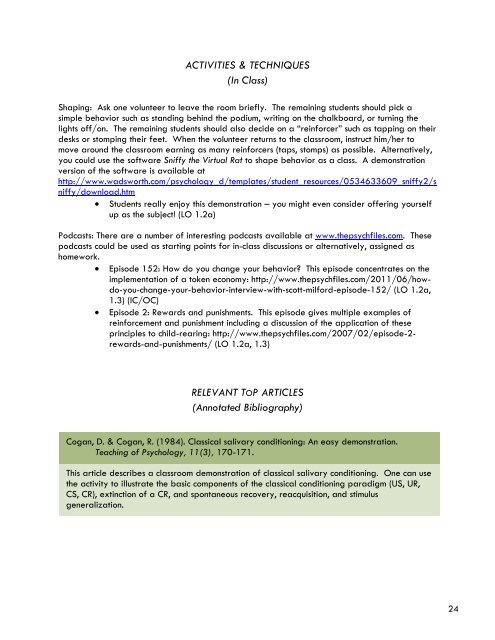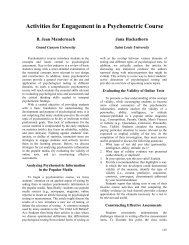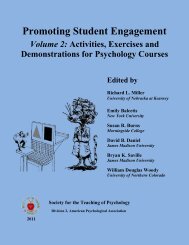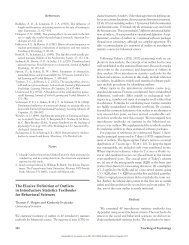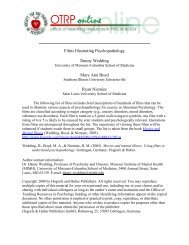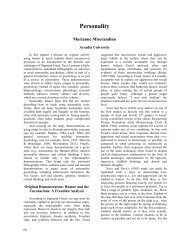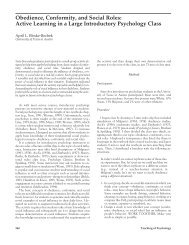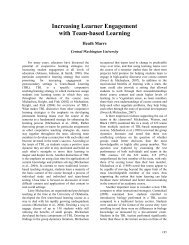INTRODUCTORY PSYCHOLOGY TEACHING PRIMER Early Career ...
INTRODUCTORY PSYCHOLOGY TEACHING PRIMER Early Career ...
INTRODUCTORY PSYCHOLOGY TEACHING PRIMER Early Career ...
Create successful ePaper yourself
Turn your PDF publications into a flip-book with our unique Google optimized e-Paper software.
ACTIVITIES & TECHNIQUES<br />
(In Class)<br />
Shaping: Ask one volunteer to leave the room briefly. The remaining students should pick a<br />
simple behavior such as standing behind the podium, writing on the chalkboard, or turning the<br />
lights off/on. The remaining students should also decide on a “reinforcer” such as tapping on their<br />
desks or stomping their feet. When the volunteer returns to the classroom, instruct him/her to<br />
move around the classroom earning as many reinforcers (taps, stomps) as possible. Alternatively,<br />
you could use the software Sniffy the Virtual Rat to shape behavior as a class. A demonstration<br />
version of the software is available at<br />
http://www.wadsworth.com/psychology_d/templates/student_resources/0534633609_sniffy2/s<br />
niffy/download.htm<br />
• Students really enjoy this demonstration – you might even consider offering yourself<br />
up as the subject! (LO 1.2a)<br />
Podcasts: There are a number of interesting podcasts available at www.thepsychfiles.com. These<br />
podcasts could be used as starting points for in-class discussions or alternatively, assigned as<br />
homework.<br />
• Episode 152: How do you change your behavior? This episode concentrates on the<br />
implementation of a token economy: http://www.thepsychfiles.com/2011/06/howdo-you-change-your-behavior-interview-with-scott-milford-episode-152/<br />
(LO 1.2a,<br />
1.3) (IC/OC)<br />
• Episode 2: Rewards and punishments. This episode gives multiple examples of<br />
reinforcement and punishment including a discussion of the application of these<br />
principles to child-rearing: http://www.thepsychfiles.com/2007/02/episode-2rewards-and-punishments/<br />
(LO 1.2a, 1.3)<br />
RELEVANT TOP ARTICLES<br />
(Annotated Bibliography)<br />
Cogan, D. & Cogan, R. (1984). Classical salivary conditioning: An easy demonstration.<br />
Teaching of Psychology, 11(3), 170-171.<br />
This article describes a classroom demonstration of classical salivary conditioning. One can use<br />
the activity to illustrate the basic components of the classical conditioning paradigm (US, UR,<br />
CS, CR), extinction of a CR, and spontaneous recovery, reacquisition, and stimulus<br />
generalization.<br />
24


